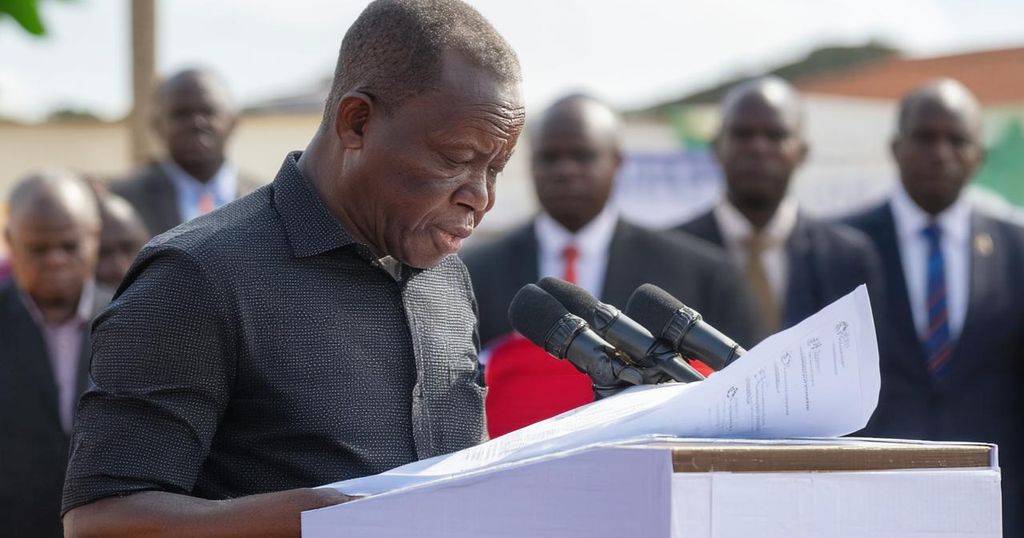Mozambique’s Ruling Party Claims Victory Amid Election Fraud Allegations
Daniel Chapo of the ruling Frelimo party has been declared the winner of Mozambique’s presidential election, obtaining over 70 percent of the votes amid allegations of electoral fraud from opposition leaders. Main opponent Venancio Mondlane claims manipulation and has called for protests against Frelimo’s extended rule. The political climate has become increasingly tense following violent attacks on opposition officials, prompting concerns over the integrity of the electoral process and the future of democracy in Mozambique.
On October 9, 2023, Mozambique’s National Election Commission (CNE) announced that Daniel Chapo, the candidate representing the ruling Front for the Liberation of Mozambique (Frelimo) party, had secured a decisive victory in the presidential election, garnering over 70 percent of the vote. Frelimo, which has held power for nearly five decades since Mozambique’s independence from Portugal in 1975, faced accusations of election fraud from opposition parties. Chapo’s main opponent, independent candidate Venancio Mondlane, received just over 20 percent of the votes and has publicly alleged electoral manipulation favoring Frelimo. In response, Mondlane has called for mass protests against what he describes as Frelimo’s prolonged and autocratic governance. “The time has come for the people to take power and say that we now want to change the history of this country,” he stated, encouraging a national demonstration through social media. The election results confirm Frelimo’s continued dominance in Mozambique, and Chapo, aged 47, will become the first president born after the country’s independence when he assumes office in January 2024. His ascension follows the tenure of Filipe Nyusi, who is stepping down after two terms as stipulated by the country’s constitution. However, the political climate remains tense, exacerbated by violence against opposition officials ahead of the election. Tragically, Elvino Dias, an advisor to Mondlane, and another opposition spokesperson were shot dead by unknown assailants, raising concerns regarding the safety and freedom of opposition members in the region. The EU observer mission highlighted disturbing developments during the election process, including reports of intimidation and interference that compromised the integrity of vote counting in various areas. Frelimo has persistently rejected these allegations and maintains that the elections were conducted in a fair and transparent manner. In a climate of increased scrutiny and strife, the future of Mozambique’s governance will depend significantly on the resolution of these allegations and the ensuing discussions regarding electoral reform and the protection of democratic processes.
The political landscape of Mozambique has long been dominated by the Frelimo party, which has ruled since the nation gained independence in 1975. Following a prolonged civil conflict with the Renamo group, which is now the main opposition party, Frelimo’s governance has frequently faced accusations of electoral malfeasance. This dynamic shapes the ongoing elections, where allegations of rigging and suppression of dissent have become commonplace. Critics assert that the Frelimo party’s longstanding grip on power has resulted in an erosion of democratic institutions, leading to heightened tensions during electoral cycles. The current electoral situation is further complicated by recent incidents of violence against opposition figures, casting a shadow over the legitimacy of the electoral process.
The recent presidential election in Mozambique has reaffirmed Frelimo’s longstanding rule, but it has also ignited significant unrest and allegations of electoral fraud, particularly from the opposition led by Venancio Mondlane. With violent incidents linked to political tensions, the stability of Mozambique’s democratic processes is under scrutiny. Observers express concern over the integrity of future elections, while the opposition continues to rally against perceived injustices in governance. As the nation navigates its political future, the resolution of these disputes will be critical to safeguarding its democratic foundations and ensuring political accountability.
Original Source: www.aljazeera.com




Post Comment